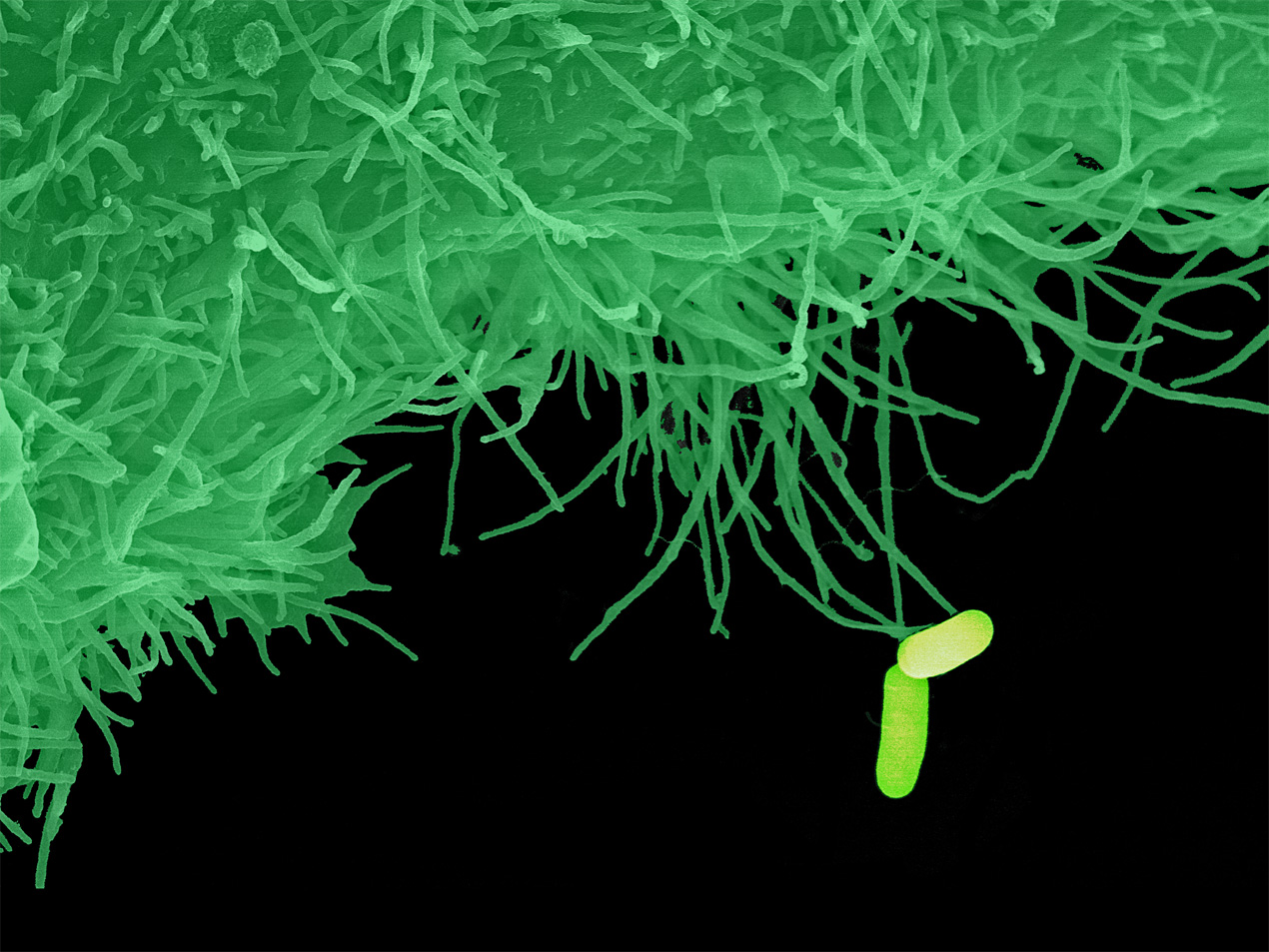Typhoid outbreak: genetic cause of extensive drug resistance found

The genetic cause behind a strain of typhoid’s resistance to five classes of antibiotics has been uncovered by scientists at the Wellcome Sanger Institute and their collaborators at Public Health England and Aga Khan University, Pakistan. There is currently a major outbreak of typhoid fever in Pakistan, and there was a case in the UK following air travel, which has been isolated and treated. This study shows the typhoid strain causing the outbreak acquired an additional piece of DNA to become resistant to multiple antibiotics, including a third-generation antibiotic.
The results, published today (20 February) in mBio suggest that treatment options are running out for typhoid, and there is an urgent need for preventative strategies including vaccines.

Typhoid fever is a bacterial infection caused by the bacterium Salmonella enterica serovar Typhi. It is highly contagious, and spreads through the human population in areas with poor water sanitation when contaminated food or water is consumed. Symptoms include fever, stomach pain, headache and constipation or diarrhoea and, if left untreated, it can become fatal.
Currently, an outbreak of drug-resistant typhoid is spreading through Pakistan and an emergency vaccination campaign is underway.
The outbreak began in November 2016, and was immediately recognised and reported to provincial public health authorities in Pakistan, where investigation into possible sources and control measures including use of a vaccine are ongoing. Public health alerts helped physicians recognise cases of typhoid that were resistant to ceftriaxone, an antibiotic reserved to treat multidrug-resistant infections. This strain was resistant to five antibiotics in total, a higher level of resistance than previously seen. The doctors treated the infections with the few remaining antibiotic options.
In the spring of 2017, collaborators Professor Rumina Hasan and Dr Sadia Shakoor from the Aga Khan University in Pakistan contacted the Wellcome Sanger Institute to genetically analyse the outbreak. Sanger Institute scientists performed whole genome sequencing of typhoid samples from Pakistan to investigate the genetic cause behind its high level of antibiotic resistance.
The team discovered that the typhoid outbreak was caused by strain H58, a strain known to be associated with multidrug resistance. When researchers looked further, they found this strain of H58 had gained an extra strand of bacterial DNA – a plasmid – that encoded for additional antibiotic resistance genes. The typhoid possibly picked up the plasmid from E. coli.
Scientists at Public Health England identified a strain of typhoid with the same high levels of resistance from an individual in the UK who had recently returned from Pakistan. Genomic comparison revealed that it was identical to the outbreak strain, meaning the outbreak had reached the UK, where it has been isolated and treated.
“We have used genetic sequencing to uncover how this particular strain of typhoid became resistant to several key antibiotics. Sporadic cases of typhoid with these levels of antimicrobial resistance have been seen before, but this is the first time we’ve seen an ongoing outbreak – which is concerning.”
Professor Gordon Dougan A senior author from the Wellcome Sanger Institute and University of Cambridge Department of Medicine
“Antibiotic resistance has been mounting in typhoid for decades. This outbreak was caused by a multidrug-resistant strain that had gone a step further and acquired an extra piece of DNA encoding additional genes for antibiotic resistance. We therefore classified this strain of typhoid as extensively drug-resistant. This is the first time we have seen an outbreak of extensively drug-resistant typhoid.”
Dr Elizabeth Klemm Co-first author from the Wellcome Sanger Institute
“The treatment options for typhoid are running out. It’s time we focus on prevention, in addition to treatment. Vaccines offer another way to tackle drug resistant infections and we have a unique opportunity to address typhoid with a new Typhoid Conjugate Vaccine that has been recently prequalified by the World Health Organisation.”
Dr Charlie Weller Wellcome’s Head of Vaccines
More information
Funding:
This work was supported by Wellcome. Isolation and shipment of typhoid strains was supported by the Aga Khan University.
Publications:
Selected websites
University of Cambridge
The mission of the University of Cambridge is to contribute to society through the pursuit of education, learning and research at the highest international levels of excellence. To date, 98 affiliates of the University have won the Nobel Prize. Founded in 1209, the University comprises 31 autonomous Colleges, which admit undergraduates and provide small-group tuition, and 150 departments, faculties and institutions. Cambridge is a global university. Its 19,000 student body includes 3,700 international students from 120 countries. Cambridge researchers collaborate with colleagues worldwide, and the University has established larger-scale partnerships in Asia, Africa and America. The University sits at the heart of one of the world’s largest technology clusters. The ‘Cambridge Phenomenon’ has created 1,500 hi-tech companies, 14 of them valued at over US$1 billion and two at over US$10 billion. Cambridge promotes the interface between academia and business, and has a global reputation for innovation. www.cam.ac.uk
The Wellcome Sanger Institute
The Wellcome Sanger Institute is one of the world’s leading genome centres. Through its ability to conduct research at scale, it is able to engage in bold and long-term exploratory projects that are designed to influence and empower medical science globally. Institute research findings, generated through its own research programmes and through its leading role in international consortia, are being used to develop new diagnostics and treatments for human disease. To celebrate its 25th year in 2018, the Institute is sequencing 25 new genomes of species in the UK. Find out more at www.sanger.ac.uk or follow @sangerinstitute
Wellcome
Wellcome exists to improve health for everyone by helping great ideas to thrive. We’re a global charitable foundation, both politically and financially independent. We support scientists and researchers, take on big problems, fuel imaginations and spark debate. wellcome.org


